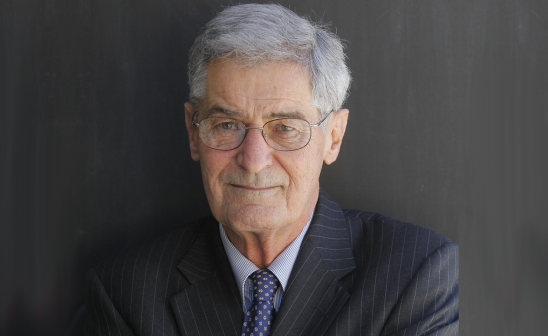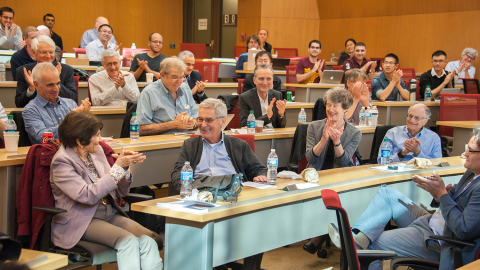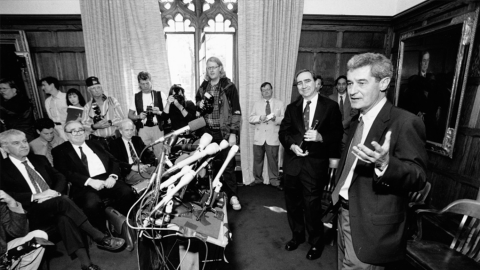Robert E. Lucas Jr., Nobel laureate and pioneering economist, 1937-2023

This story was originally published by UChicago News. Read the article on their site here.
University of Chicago scholar’s research on rational expectations transformed the field of macroeconomics
Robert E. Lucas Jr., a Nobel Prize-winning economist whose revolutionary theories transformed the field of macroeconomics and our understanding of economic policy, died May 15. He was 85.
A member of the University of Chicago faculty for four decades, Lucas, AB’59, PhD’64, was the John Dewey Distinguished Service Professor Emeritus in Economics and the College. He won the Nobel Prize in 1995 for developing and applying the hypothesis of rational expectations, which holds that people make economic choices based on their previous experiences and future expectations. In announcing the Nobel, the Swedish Academy of Sciences called Lucas “the economist who has had the greatest influence on macroeconomic research since 1970.”
Lucas’ pioneering research had a profound effect on the field of economics. His work has shown that because people make rational decisions about their economic welfare, their actions can alter the expected results of government policies. It had ripple effects in macroeconomic analysis and economic policy, because it gave governments and central banks a more critical way to think about fiscal intervention.
The idea that economists cannot sufficiently predict the effects of policy changes unless they incorporate individual decisions, especially expectations of the policy itself, is known as the “Lucas critique.” It is one of several major contributions Lucas made to economic theory over his field-defining career—from areas ranging from investment to unemployment, economic growth to monetary policy.
“Bob leaves behind a legacy of revolutionary research, teaching and leadership that transformed the field of economics and this department,” said Prof. Robert Shimer, chair of the Kenneth C. Griffin Department of Economics at UChicago. “Bob was always curious about new ideas—even ideas that seemed opposed to his fundamental contributions to economic thought. He could talk economics for hours, with insights informed by his deep knowledge of economic history, economic data and economic theory. I will miss him.”
Hypothesis of rational expectations
Though theories about rational expectations had previously existed, Lucas’ pioneering work applied the theory to the economy as a whole. Throughout the 1970s, he published several papers which further developed the hypothesis, first created in 1961 by John Muth.
In 1972, Lucas published his groundbreaking paper “Expectations and the Neutrality of Money,” in which he applied rational expectations to the “Phillips curve,” which shows the relationship between inflation and unemployment.
Though the prevailing thought was that increased inflation could lower unemployment rates, Lucas’ dynamic model showed that inflation had no effect on the long-run-average—a breakthrough idea called the Lucas islands model.
Nobel laureate Edward Prescott once said he could “think of no paper in economics as important” as the 1972 paper. Lucas’ longtime UChicago colleague, Nobel laureate Gary Becker, once recalled that Lucas’ research “was initially met with hostility, but it came to be accepted as the view of the future.”
“The effect of his work is to really change the way economists think about macroeconomics,” said the late UChicago economist Sherwin Rosen in 1995, on the day Lucas won his Nobel Prize. “It kind of destroyed the Keynesian model. This really took a lot of the thunder out of the Keynesian way of thinking.”
In addition to his Nobel Prize-winning work on rational expectations, Lucas is also remembered for his contributions to New Classical economic theory and many other major contributions that include his name: the Uzawa-Lucas model of human capital accumulation, the “Lucas paradox,” which examines why capital does not flow to developing countries from developed ones as often as would be expected; the Lucas Tree, a foundational theory on asset prices; and the Lucas span-of-control, his reach on the theory of the firm.
“It has been my privilege to have been Bob Lucas’ colleague since the early 1980s,” said Nobel laureate Lars Peter Hansen, the David Rockefeller Distinguished Service Professor in Economics, Statistics and the Booth School of Business. “Bob was truly an outstanding intellect in the group of scholars who made Chicago economics extraordinary. I remember many conversations with Bob that helped me address challenges in my own research.”
‘Chicago has been a marvelous place for me’
Born Sept. 15, 1937 in Yakima, Washington, Lucas at age 17 earned a scholarship to the University of Chicago. He traveled by train almost 2,000 miles to start his undergraduate degree in 1955—an experience Lucas recalled in his Nobel biography:
“When I began the 44-hour train trip ‘back east’ to Chicago,” he wrote, “I was pretty sure something interesting would turn up.”
As a history major, Lucas was fascinated by the economic lives of people living in the Roman Empire. He pivoted to economics for his doctorate, learning from pioneering economists including Milton Friedman. In 1962, he became a lecturer at UChicago and began his prolific research career.
“Bob leaves behind a legacy of revolutionary research, teaching and leadership that transformed the field of economics and this department.”
Though he left Chicago to teach at Carnegie Mellon University in 1963, Lucas returned to UChicago in 1974 and remained there for the next 40 years—retiring from teaching in 2015 but continuing to conduct research and mentor students well into his 80s.
“Chicago has been a marvelous place for me, as I knew it would be from my student experiences,” Lucas wrote in 1995. “I have been stimulated by colleagues and graduate teaching into research on monetary theory, international-trade, fiscal policy, and economic growth: all the basic topics in macroeconomics.”
He authored several books, including Studies in Business-Cycle Theory (1981), Rational Expectations and Econometric Practice (1981, with Thomas Sargent) and Recursive Methods in Economic Dynamics (1989, with Nancy Stokey and Edward Prescott). Lucas’ Lectures on Economic Growth were published in 2002, and his Collected Papers on Monetary Theory in 2013.
“Bob was truly an outstanding intellect in the group of scholars who made Chicago economics extraordinary.”
Lucas regularly attended workshops and faculty lunches at UChicago until earlier this year. Colleagues remember how he was welcoming of young scholars, helping mentor and co-author research with them. His former students included several distinguished scholars in academia and government.
“Bob Lucas was one of the architects of modern economics,” said Esteban Rossi-Hansberg, PhD’02, the Glen A. Lloyd Distinguished Service Professor in the Kenneth C. Griffin Department of Economics at UChicago. “His work provided key foundations for the way we understand virtually all topics in economics. To me, he was an intellectual father, a role model and a friend.”
The recipient of many honors, Lucas was a fellow of the Guggenheim Foundation, the American Academy of Arts and Sciences and the National Academy of Sciences, and a past president of the Econometric Society and the American Economic Association.
Lucas is survived by his partner Nancy Stokey, the Frederick Henry Prince Distinguished Service Professor of Economics at UChicago and a frequent co-author; his sons with his first wife, Rita Cohen Lucas: Stephen and Joseph; his sister Jenepher Spurr; his brother Peter J. Lucas; and grandchildren Lily, Ginger, Michael, Solomon and Sophia.
In lieu of flowers, the family requests donations in Lucas’ name to Doctors Without Borders. Information on a public memorial is forthcoming.
 THE UNIVERSITY OF CHICAGO
THE UNIVERSITY OF CHICAGO



